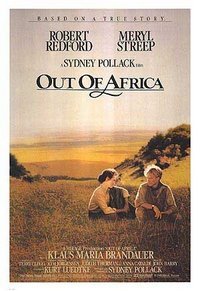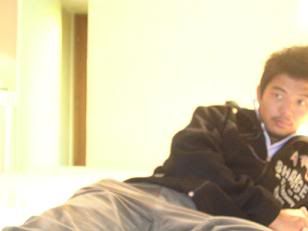A lazy weekend to be spent... (3/3)
Last Sunday, I was supposed to go for the dragon boat training. However, since I had taken my cough mixture, by that time, I woke up, it was already 12:45pm and it was already a bit too late and it would be too rushed for me to pack my stuff for this training. I sms-ed Jane that I was still not feeling well and needed more ample rest.
Meanwhile, I went to my parent's room to watch Out of Africa DVD which I also bought in Shanghai. It described a Danish baroness who left Denmark to marry a British philanderer in Kenya and how she spent her life with her husband in a loveless relationship and how she met another man in her life, Bensy. At the end of this story, she realised that she could not have 2 men whom she loved with her heart.
I asked myself whether my personality was like an African lifestyle which refused to be tamed or tied down by the relationship. During the quarrel between Karen and Densy, Densy told her that "...I cannot love you more just because of the paper..." when Karen told him that she wanted to settle down with him by going through formal marriage. True enough, just before we broke up, my ex told me in his sms: "I really need you more than you need me". And my mom once remarked to me: "I never expect my son to be like a lone ranger, explorer or adventurer. All my family members including relatives are not like you and I never taught you to be one. I don't know why you turn out to be like that". So, the final question I ask myself is that am I really ready for the love relationship and even if I am, would my committment to this relationship compromise my lifestyle dramatically?
Here is the symposis
 The film opens in Denmark as an older Karen Blixen (Streep) briefly remembers hunting in Denmark, then the years she spent in Africa (1914-1931). Looming large in her memory is the figure of Denys Finch Hatton (Redford), a local big-game hunter she met when she arrived in Africa to start what she thought would be a dairy farm together with her husband, Baron Bro von Blixen-Finecke (Brandauer).
The film opens in Denmark as an older Karen Blixen (Streep) briefly remembers hunting in Denmark, then the years she spent in Africa (1914-1931). Looming large in her memory is the figure of Denys Finch Hatton (Redford), a local big-game hunter she met when she arrived in Africa to start what she thought would be a dairy farm together with her husband, Baron Bro von Blixen-Finecke (Brandauer).Things turn out differently for her than anticipated, as the blue-blooded but poor Baron has used her money to purchase a coffee plantation instead of a dairy farm. He also shows little inclination to put any work into it, preferring to hunt game instead. While from the beginning, their marriage is depicted as mostly symbiotic (her family has money, while the Baron has a title), Karen does eventually develop feelings for him and is distressed when she learns of his affairs.
To make matters worse, she contracts syphilis from her philandering husband, which at the time was a very dangerous condition, necessitating her return to Denmark for a possible cure using the (1910) medicine Salvarsan [Arsphenamine] (before advent of penicillin). Correction, the film lends the thought that Karen contracts syphlis from her husband however according to a DVD release of the film with special bonus features, the director reveals that her condition was genetic from her father, hence his suicide when Karen was only 10 years of age.
After she has recovered and returned to Africa, a relationship between her and Denys begins to develop. However, after many unsuccessful attempts at turning their affair into a lasting relationship and possibly marriage, she must realize that Denys is as impossible to own or tame as the African wildlife itself. His eventual death in a plane crash is foreshadowed in the movie by the tale of Maasai people who would perish in captivity. At his funeral in the Ngong Hills, as Karen prepares to toss a handful of soil into the grave, she hesitates, then turns away from the other Europeans, brushing her hand instead through her hair, in the native custom.
As coffee prices have dropped dramatically after the First World War, Karen is forced to give up the plantation and return to Denmark where she becomes an author, writing about her experiences in Africa. The film Karen is forced to return to Denmark after a catastrophic fire that destroys her entire crop of coffee. There is no mention, in the film, of a fall in coffee prices.
The movie tells this story as a series of six loosely coupled episodes from Karen Blixen's life, intercut with her narration.
The final narration, about Denys's grave, is from her book Out of Africa, while the others have been written for the film in imitation of her very lyrical writing style. The pace of the movie is often slow, reflecting the book, "Natives dislike speed, as we dislike noise..."
After I watched this DVD, I went to Sembawang Library to borrow more photography books to educate myself with rudimentary concept of photography.


0 Comments:
Post a Comment
<< Home